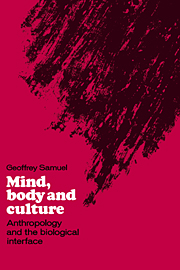Book contents
- Frontmatter
- Contents
- Preface
- 1 New paradigms and modal states
- 2 A natural science of society
- 3 Starting points I
- 4 Starting points II
- 5 Interpreting the flow
- 6 The multimodal framework
- 7 The Ndembu modal state repertoire
- 8 Sociocentric modal states
- 9 Shamanic mechanisms
- 10 The growth of the clerical approach
- 11 Technical and transformational mechanisms
- 12 Mind, body and culture
- Notes
- References
- Index
7 - The Ndembu modal state repertoire
Published online by Cambridge University Press: 04 September 2009
- Frontmatter
- Contents
- Preface
- 1 New paradigms and modal states
- 2 A natural science of society
- 3 Starting points I
- 4 Starting points II
- 5 Interpreting the flow
- 6 The multimodal framework
- 7 The Ndembu modal state repertoire
- 8 Sociocentric modal states
- 9 Shamanic mechanisms
- 10 The growth of the clerical approach
- 11 Technical and transformational mechanisms
- 12 Mind, body and culture
- Notes
- References
- Index
Summary
The first six chapters of this book have introduced the ‘modal state’ and other basic elements of the multimodal framework (MMF). In the remaining six chapters the MMF will be applied to some ethnographic material and some of the consequences of adopting it will be explored.
In the present chapter we consider a single body of ethnographic material: Victor Turner's work on the Ndembu of Central Africa. A central question will be the existence of mechanisms within societies for creating and maintaining a specific repertoire of ‘modal states’ among their members. As I emphasized in chapter 6, the MMF itself does not make any assumptions about how modal states arise within individuals, beyond the implicit assumption that the process has ultimately to be explained in ‘relational’ terms (i.e. in terms of processes within the social manifold). Turner's research, when translated into the terms of the MMF, amounts to a theory about such processes. This theory states that Ndembu ritual can be understood as a series of mechanisms for creating modal states and maintaining them in a condition of ‘balance’.
Turner's analysis, especially in his earlier works, has many of the features of the functionalist school of British anthropology. Ndembu society is treated as a coherent whole whose unity and stability is constituted precisely by the rituals we are about to examine. One of the major reasons for introducing the MMF was to allow for processes of change over time that are difficult to theorize adequately within functionalist or structuralist frameworks.
- Type
- Chapter
- Information
- Mind, Body and CultureAnthropology and the Biological Interface, pp. 79 - 92Publisher: Cambridge University PressPrint publication year: 1990



